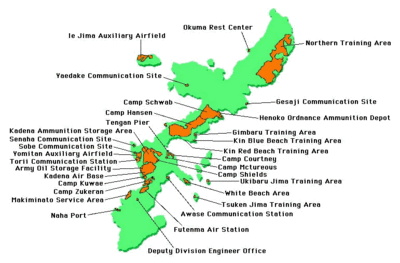1998 Eskridge car crash
In 1998, Randall Eskridge, a Flight Equipment Technician in the Marine Aerial Refueler Transport Squadron 152 based out of Okinawa, caused a fatal hit-and-run crash. On October 7, 1998, while driving drunk, his car struck Yuki Uema, an 18-year-old Japanese high school student, who was riding her motorcycle home. After hitting her, Eskridge did not stop to help her. Uema was in a coma for a week and died from complications of her injuries. Uema's death followed the infamous 1995 Okinawan rape incident, where on September 4, 1995, three U.S. servicemen rented a van and kidnapped and raped a 12-year-old 6th-grade Japanese girl. The Eskridge car crash caused an uproar in Okinawa due to the raw emotion in the Okinawan population after the rape incident, the fact the Marines refused to hand over Eskridge, and continued opposition to the American presence in Japan.
Crash

Yuki Uema, 18, was riding her motorcycle home at 4:30 on October 7, 1998, when she was knocked down by a hit-and-run driver outside Camp Zukeran, a U.S. military base north of Naha, Okinawa's capital.[2] Eskridge was caught after an alert guard at Camp Zukeran's gate noticed heavy damage to the grille of his vehicle.[3]
Initially the Americans refused to hand over Eskridge. The SOFA agreement between Japan and America requires the accused to be handed over to local authorities only for a heinous crime.[4] After much outrage and protest, he was finally handed over to the local police a week after the incident.
The incident brought to light one of many grievances felt by the Okinawan people towards the US military presence. After the Padilla case, in particular, it was revealed that there were over a thousand car crashes a year involving US military personnel in Okinawa.[5] Chalmers Johnson states that it wasn't until 1997 that American military-owned vehicles were required to have license plates, often making it impossible for hit-and-run victims to identify the vehicle that hit them.[5][6]
Trial
During the trial the prosecution said that Marine Cpl. Randall Eskridge committed a "malicious crime due to his low regard for human life," seriously injuring Yuki Uema while driving under the influence of alcohol. (In fact Yuki Uema died from her injuries.) Eskridge was tried on charges of drunken driving, leaving the scene of an crash and professional negligence to cause injury.[7] Even though he admitted his wrongdoing, the prosecutor told the court that the accused deserved a stiff penalty.[8] In 1999, Eskridge was sentenced to 20 months in an Okinawan jail.[4]
See also
Bibliography
- Notes
- ↑ "Okinawa death strains US-Japan relations". BBC News. October 15, 1998. Retrieved 2009-03-14.
- ↑ PATRICK SMITH (November 9, 1998). "Can Okinawa Live Without The U.S.?". Time Magazine. Retrieved 2009-03-14.
- ↑ Johnson 2001, p. 46
- 1 2 Johnson 2001, p. 47
- 1 2 Johnson 2001, p. 45
- ↑ "The SACO Final Report". Ministry of Foreign Affairs (Japan). December 2, 1996. Retrieved May 7, 2010.
- ↑ "Death Stirs Anti-U.S. Feeling". CBS Worldwide Corp. 1998-10-15. Retrieved 2009-03-14.
- ↑ "30-month jail term asked for U.S. marine in hit-and-run". Kyodo News International. Feb 1, 1999. Retrieved 2009-03-14.
- References
- Johnson, Chalmers (2001). Blowback: The Costs and Consequences of American Empire (2001 ed.). Macmillan. ISBN 9781429928113. - Total pages: 288